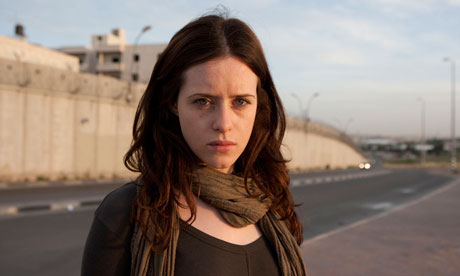IN THE MEDIA
Angelic Arabs and murderous Jews add up to televisual propaganda
February 16, 2012 | Jamie Hyams & Tzvi Fleischer

The Australian – February 16, 2012
PROPAGANDA comes in many forms. The British/French mini-series, The Promise, recently shown over four consecutive Sundays on SBS TV, is a particularly insidious example. It tells the story of a British girl, Erin, just out of school, who stays with the family of her closest friend in Israel during the second intifada.
She has taken the diary of her grandfather Len, who served as a British soldier in mandate Palestine from 1945 to 1948, so the action switches between the British battling the treacherous Jews in the 1940s and the brutal Israelis oppressing the Palestinians today.
Although promoted as a drama, it effectively purported to be a depiction of historical events. However, the series was characterised by crudely propagandist messages directed against Israel and Jews.
Booker Prize winning novelist Howard Jacobson captured succinctly the manipulation that is awash throughout the series: “Though I, too, have found Palestinians to be people of immense charm, I could only laugh in derision at The Promise every time another shot of soft-eyed Palestinians followed another shot of hard-faced Jews.”
There was a flurry of official complaints made to SBS by individuals and the Executive Council of Australian Jewry. Stepan Kerkyasharian, the chairperson of the Community Relations Commission of NSW and former head of SBS Radio, wrote to SBS saying “the portrayal of an entire nation in a negative light as part of a dramatic work is not acceptable.” However, the broadcaster’s complaints committee – which consists solely of SBS employees, with five of the seven members the network’s own senior producers – unsurprisingly judged otherwise. The complaints committee argued that the depiction of Jews and Arabs were “incidental to the main purpose of the storyline in the drama series as a whole; namely the dramatisation of two personal journeys made some 60 years apart as a young girl becomes obsessed with her grandfather’s diary”.
But the sheer quantity of incidents designed to negatively portray all Jewish and Israeli characters makes the vilification and historical misrepresentation far more than incidental. Arabs are almost all portrayed sympathetically, while Jews in Mandate Palestine are murderous, Jews in present-day Israel are callous, and Israeli soldiers are capricious and brutal. The Promise blames Jews – largely portrayed as foreign invaders who enforce their usurpation by racist policies and murderous terrorism – for the violence leading up to the 1948 war.
There is no mention of Arab attacks before 1948, including the 1886 attack on Petah Tikva, attacks against Jewish worshippers at the Western Wall in 1911, pogroms against Jews in 1920, 1921 and 1929, the Hebron Massacre in 1929, the years of widespread Arab terror between 1936 and 1939 and atrocities committed by Palestinians against Jews in the period 1946-8.
Nor does the series portray the decision of the Palestinian leadership and the Arab League to use force to prevent the implementation by the UN of its resolution in favour of partition in November 1947, which the Jews accepted and the Arabs rejected.
The series does not attempt to convey the historical and legal justifications for the establishment of Israel, implying that Israel exists solely as a consequence of the Holocaust. Ignored were the waves of mass Jewish immigration into the country between 1881 and 1939 and that Jewish immigrants established the institutions of statehood – government, civil society and a viable economy – well before the Holocaust.
The series does not mention the British obligation to establish a Jewish national home in Palestine under the only legal basis for Britain’s presence in the country in the first place – the 1920 League of Nations mandate. The series is silent on the Jewish connection to the land of Israel for more than 3000 years, the continuous Jewish presence in Palestine over that time, and Israel’s many efforts to make peace with its Arab neighbours from 1947 onwards
Apparently after becoming aware of the inaccuracies, SBS decided, from the second episode, to preface it with a disclaimer that misleadingly read: “This program is a work of fiction inspired by a true story”. Then apparently acknowledging the program was not inspired by any “true story” subsequent episodes were prefaced with the disclaimer “This is a drama inspired by the accounts of British soldiers who served in Palestine”, regrettably deleting the word “fictional”.
None of these captions made it clear The Promise is simply fictional drama – as SBS subsequently argued it was in dismissing complaints about it. But this appears to be a pretence seized on by the SBS executives unwilling to acknowledge the truth – The Promise was agitprop that reinforced dangerous stereotypes and violated SBS’s obligations under its charter not to broadcast material that damages mutual understanding.
Jamie Hyams and Tzvi Fleischer work at the Australia/Israel and Jewish Affairs Council.
Tags: Israel





